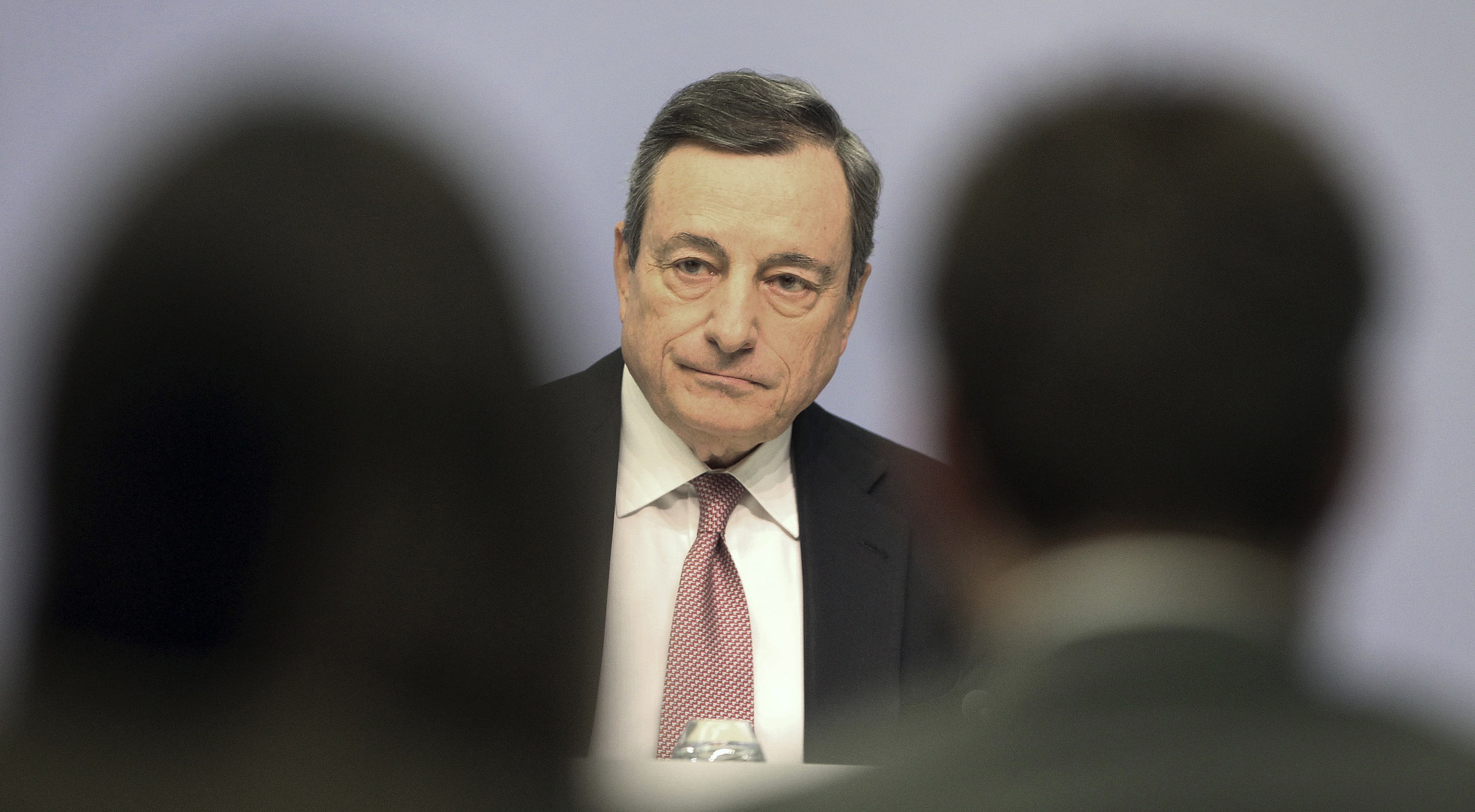ECB says it is armed to face growing risks
If Mario Draghi is feeling hemmed in by a worsening economic outlook he didn’t show it, saying the ECB has plenty of tools available to respond to the situation (Daniel ROLAND)
Frankfurt am Main (AFP) – European Central Bank chief Mario Draghi warned Thursday that risks to the eurozone economy were “moving to the downside”, acknowledging for the first time that waning global momentum was weighing on the region’s outlook.
But he stressed that the ECB had “not run out of” tools to tackle worsening headwinds, suggesting the bank was in no rush to tighten monetary policy even after it last month ended a major stimulus scheme.
“We have a long list of instruments and we stand ready to use them,” Draghi told reporters in Frankfurt.
Speaking afer the ECB’s first governing council meeting of the year, Draghi said policymakers were unanimous “about acknowledging the weaker momentum and changing the balance of risk for growth”.
In past meetings, the ECB had judged the risks as “broadly balanced”.
But fears of a global downturn have intensified as markets fret over Brexit, stuttering Chinese growth, the fallout from US-led trade tensions and problems in the German car industry.
“The risks surrounding the euro area growth outlook have moved to the downside on account of the persistence of uncertainties related to the geopolitical factors and the threat of protectionism, vulnerabilities in emerging markets and financial market volatility,” Draghi said.
The latest hard and soft economic data have “continued to be weaker than expected,” he added, blaming “softer external demand and some country- and sector-specific factors”.
Eurozone growth slowed to 0.2 percent in the third quarter of 2018, after an expansion of 0.4 percent in the two previous quarters.
Most experts believe the fourth quarter figures will also disappoint.
And data for early 2019 are troubling observers too, with a January purchasing managers’ index (PMI) reading falling to 50.7 points — just above the 50-point boundary between economic growth and contraction.
“With today’s meeting, the ECB has joined the crowd of concern,” but “also does not know where the eurozone economy is headed,” ING Diba bank analyst Carsten Brzeski commented.
Policymakers “will try to buy as much time as possible in the coming months” to allow hard-to-read threats like Brexit and trade friction to either blow over or gain definition, he predicted.
– ‘All tools available’ –
The darkening clouds come after the ECB in December ended a massive government and corporate bond-buying scheme that been propping up the eurozone economy.
The easy money scheme saw the Frankfurt institution pump 2.6 trillion euros ($3 trillion) into the eurozone economy over a nearly four-year period.
Its end marked the removal of a key pillar of support to the economy, with the ECB saying it was confident the region could weather upcoming challenges and that inflation was on track to meet the bank’s goal of just under 2.0 percent.
Since then however, the International Monetary Fund (IMF) has downgraded its 2019 growth forecast for the 19-nation currency bloc to 1.6 percent — slightly lower than the ECB’s 1.7-percent estimate.
Eurozone inflation meanwhile has fallen back — notching up just 1.6 percent in December.
Draghi on Thursday stressed that ECB policymakers assessed “the likelihood of a recession as being low” but that an “ample degree” of monetary accommodation remained necessary.
“It’s not true that the ECB has run out of fuel or has run out of instruments. We have all of our toolbox still available,” Draghi said, listing ultra-low interest rates, reinvestments from maturing bonds and super-cheap loans to banks as examples.
Analysts are increasingly speculating that the ECB may launch a third wave of so-called TLTRO loans to inject liquidity into the eurozone banking system.
The scheme allows banks to take out loans at very low, even negative rates, on the condition that they step up lending to firms and households.
“Several speakers actually raised this issue” at the ECB table, Draghi said, “but no decision was taken”.
In the United States, the Federal Reserve has already responded to the weaker outlook by slowing down rate hikes.
With markets largely untroubled Thursday by Draghi’s darker risk assessment, “ECB actions should matter more than words over the next few months,” Pictet Wealth Management analyst Frederik Ducrozet said.
New TLTROs “are all but certain, along with changes to forward guidance” on when interest rates will change, he added.
The ECB has said rates will stay at their current record lows at least until the second half of the year, although many economists expect them to stay there for longer.
Disclaimer: This story is published from a syndicated feed. Siliconeer does not assume any liability for the above story. Validity of the above story is for 7 Days from original date of publishing. Content copyright AFP.


